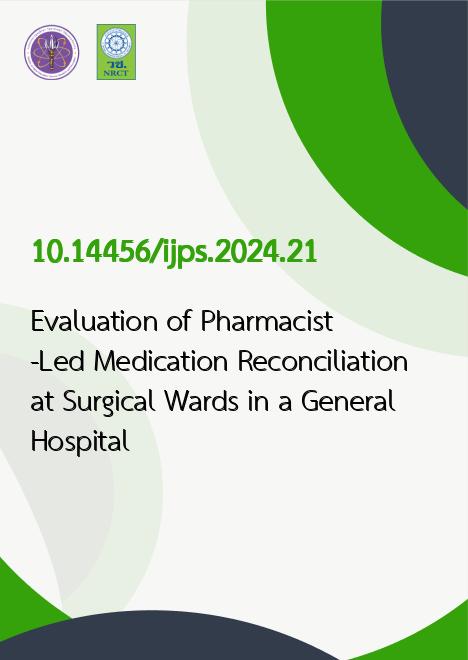
|
Evaluation of Pharmacist-Led Medication Reconciliation at Surgical Wards in a General Hospital |
|---|---|
| รหัสดีโอไอ | |
| Creator | Patawee Punuch-apai |
| Title | Evaluation of Pharmacist-Led Medication Reconciliation at Surgical Wards in a General Hospital |
| Contributor | Sanguan Lerkiatbundit, Woranuch Saengcharoen |
| Publisher | Faculty of Pharmaceutical Sciences KKU MSU UBU |
| Publication Year | 2567 |
| Journal Title | Isan Journal of Pharmaceutical Sciences |
| Journal Vol. | 20 |
| Journal No. | 4 |
| Page no. | 36-50 |
| Keyword | medication reconciliation, medication error, hospital pharmacists, surgical ward |
| URL Website | https://tci-thaijo.org/index.php/IJPS |
| Website title | Isan Journal of Pharmaceutical Sciences, IJPS |
| ISSN | 19050852 |
| Abstract | Medication reconciliation is a standard within the medication management system aimed at reducing medication errors that may occur. Objective: To develop the coordination of medication reconciliation and to investigate the medication errors, the duration of medication reconciliation, and the satisfaction of medical staff. Methods: The research design was a prospective descriptive study. The sample was patients in the surgical ward of a hospital and were taking at least one medication for chronic diseases. The medication reconciliation process was completed in all four steps. The analysis of medication error rates, types and severity levels of medication errors, the duration of medication reconciliation, and healthcare providers' satisfaction was conducted using descriptive statistics. Factors associated with the occurrence of medication errors were analyzed using the Chi-square test. Results: The sample size in this study consisted of 243 participants. The incidence rate of medication errors was 28.1% at admission and 15.0% at discharge. Most discrepancies in medication lists at both admission and discharge were unintentional differences made by physicians (44.4%). The most common type of medication error was omission of the original medication (79.1%), with the majority being category B errors (non-harmful as the error did not reach the patient) (64.6%). Most physicians accepted the correction suggestions (75.5%). Additionally, it was found that the length of hospital stay and the medications that patients received before discharge were significantly associated with the occurrence of medication errors (p <0.05). The median time taken by pharmacists to complete all four steps of medication reconciliation for one patient was 28 minutes (IQR 21, 33) with the steps of collecting and verifying taking the most time. Medical staff satisfaction with the medication reconciliation process was mostly at the highest level (92.4%). Conclusion: Medication reconciliation is an important process that can enhance patient safety in medication use, prevent medication errors from admission to discharge, and increase the role of pharmacists in collaborating with other multidisciplinary teams in hospitals. |
